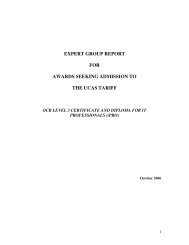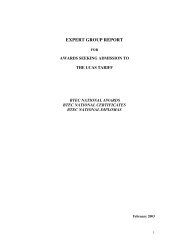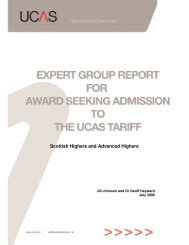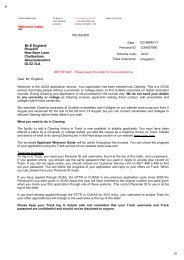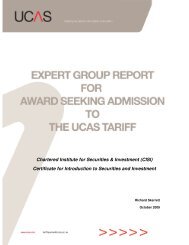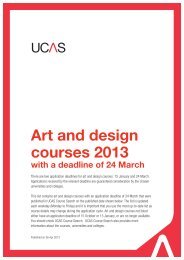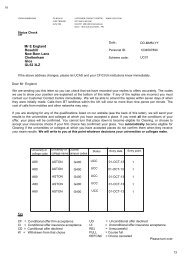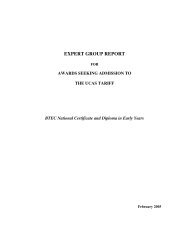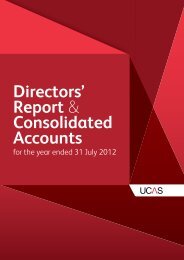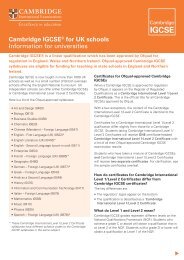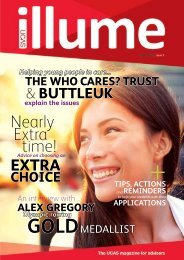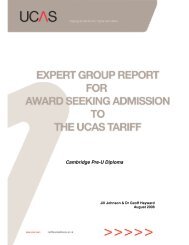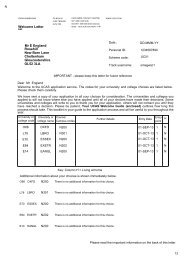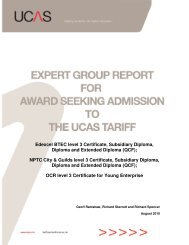International qualifications 2013 (pdf) - CUKAS
International qualifications 2013 (pdf) - CUKAS
International qualifications 2013 (pdf) - CUKAS
You also want an ePaper? Increase the reach of your titles
YUMPU automatically turns print PDFs into web optimized ePapers that Google loves.
Appendix C – <strong>International</strong> Baccalaureate middle years programme, certificate and diploma<br />
Group 4 – Experimental sciences<br />
Biology<br />
Chemistry<br />
Design technology<br />
Environmental system and societies (SL only)<br />
Physics<br />
Computer science<br />
Sports, exercise and health science (SL)<br />
Environmental system and societies (SL) – (interdisciplinary)<br />
Group 5 – mathematics<br />
Mathematics (HL)<br />
Mathematics (SL)<br />
Mathematical studies (SL)<br />
Further mathematics (HL)<br />
All students must do a course in mathematics<br />
Group 6 – Arts<br />
Music<br />
Theatre<br />
Visual arts<br />
Film<br />
Literature and performance (interdisciplinary)<br />
A syllabus designed by an experienced IB school according to its<br />
own needs, interests and expertise, and approved by the IB under<br />
strict criteria. A candidate may choose only one SBS subject as<br />
one of their standard level choices.<br />
All Diploma Programme candidates will also undertake:<br />
a. Theory of knowledge – a 100-hour course taught over two<br />
years which is an interdisciplinary requirement intended to<br />
stimulate critical reflection on knowledge and issues.<br />
b. Extended essay – a substantial piece of independent<br />
research work about 4,000 words long. It must be written in<br />
a Diploma Programme subject. 50 hours.<br />
c. Creativity, action, service (CAS) – the CAS programme is<br />
provided by the school and monitored by the IB. 150 hours.<br />
Assessment method:<br />
Assessment in the IB varies widely across the disciplines and<br />
includes multiple choice, essay, data analysis, short answer and<br />
structured questions. In most subjects the teachers contribute<br />
more than 20% of the marks through internal assessment which<br />
are then moderated by external examiners. Students are<br />
assessed on the whole course in final examinations held at the<br />
end of the two years. The courses are not modular. Candidates<br />
not completing all the requirements for a Diploma may be<br />
awarded certificates for individual subjects. Assessment<br />
procedures are kept constantly under review to ensure both<br />
integrity and quality. Their validation includes, amongst other<br />
activities, question paper and marking scheme review by external<br />
advisers, standardisation of examiners, marking, moderation,<br />
grade awarding and arbitration procedures, an enquiry upon<br />
results service, and public reporting of statistics.<br />
Examination timing:<br />
May and November<br />
Date of result publication:<br />
Early July and early January<br />
Grading system:<br />
Each subject is graded 1–7 (7 being the highest) The<br />
recommendation for the award of the final grade in each subject<br />
is normally the responsibility of the Chief Examiner. A grade will<br />
not normally be awarded to a candidate in any subject for which<br />
any of the required assessment components have not been<br />
completed.<br />
All assessment components for each of the six subjects and the<br />
additional Diploma requirements must be completed in order to<br />
qualify for the award of the Diploma.<br />
The Diploma will be awarded to a candidate whose total score is<br />
24, 25, 26 or 27 points, provided all the following requirements<br />
have been met:<br />
a. numeric grades have been awarded in all six subjects<br />
registered for the diploma<br />
b. all CAS requirements have been met<br />
c. at least a grade D has been awarded for both theory of<br />
knowledge and the extended essay<br />
d. there is no grade 1 in any subject<br />
e. there is no grade 2 at HL<br />
f. there is no more than one grade 2 at SL<br />
g. overall, there are no more than three grades 3 or below<br />
h. at least 12 points have been gained on HL subjects<br />
(candidates who register for four HL subjects must gain at<br />
least 16 points at HL)<br />
i. at least nine points have been gained on SL subjects<br />
(candidates who register for two SL subjects must gain at<br />
least six points at SL)<br />
j. the candidate has not been found guilty of malpractice by the<br />
IB organisation<br />
The Diploma will be awarded to a candidate whose total score is<br />
28 points or above, provided all the following requirements have<br />
been met:<br />
a. numeric grades have been awarded in all six subjects<br />
registered for the diploma<br />
b. all CAS requirements have been met<br />
c. grades A (highest) to E (lowest) have been awarded for both<br />
theory of knowledge and an extended essay, with a grade of<br />
at least D in one of them<br />
d. there is no grade 1 in any subject<br />
e. there is no more than one grade 2 at HL<br />
f. there are no more than two grades 2 at SL<br />
g. overall, there are no more than three grades 3 or below<br />
h. at least 11 points have been gained on HL subjects<br />
(candidates who register for four HL subjects must gain at<br />
least 14 points at HL)<br />
i. at least eight points have been gained on SL subjects<br />
(candidates who register for two SL subjects must gain at<br />
least five points at SL)<br />
j. the candidate has not been found guilty of malpractice by<br />
the IB organisation<br />
A maximum of three examination sessions is allowed in which to<br />
satisfy the requirements for the award of the IB Diploma.<br />
AWARD OF INTERNATIONAL BACCALAUREATE COURSES<br />
A candidate who is not registered for the full Diploma may<br />
register for examination in one or more subjects.<br />
Such a candidate is classified as a Diploma Programme (DP)<br />
course student and receives a certificate recording the result(s)<br />
obtained in each subject. Candidates who have registered for<br />
the full Diploma, but who have not fulfilled all the requirements<br />
for the award, will receive a certificate indicating the results<br />
obtained in individual DP courses. A Diploma candidate who<br />
wishes to register for more than the six subjects required for<br />
the Diploma may register for one or more additional subjects at<br />
HL.<br />
80 INTERNATIONAL QUALIFICATIONS



